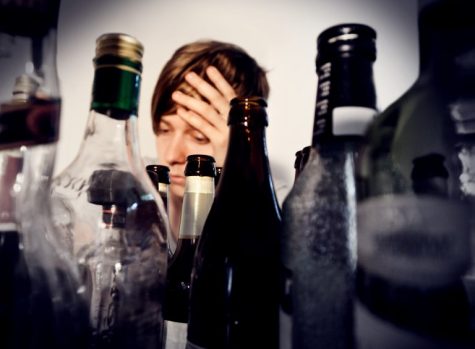The darker side of college life: substance abuse
February 28, 2021
When you think of the “college experience” you may think of making new friends and gaining independence. For some students, these parts of the “college experience” can equate to parties, peer pressure and loneliness. In an attempt to escape these stressors, students may turn to alcohol or drugs, which leaves them vulnerable to developing or awakening a life-threatening disease that can put students at risk for academic failure, unemployment and isolation from the world. There is no cure for the disease, only recovery, and the name of this disease is addiction.
“I started drinking when I was 19. I had my wisdom teeth taken out, and I got addicted to the pain pills. Once that happened, it just spiraled out of control. For a drug addict, if you use once, you can’t stop on your own. I went to rehab 15 times. Every time I’d get out, I’d relapse. They tell you to change everything about your life, where you stay, the people you’re around, the things you do, you have to change everything. I didn’t do that until the last time I went to rehab,” Jimmy Secoy, graduate student in the counseling program, said.
Secoy, who has been in recovery for six years and four months, said multiple factors led to his addiction, including social and environmental influence. Secoy has Tourette syndrome, and growing up, he felt like he didn’t fit in.
“I felt different. That first time I drank and smoked a cigarette, that mental pain, that emotional pain kind of went away, and I didn’t think about it because it numbed it. I was like ‘Wow, I like the way that it takes away that pain. I think I’ll keep doing this.’ Once I did that, it caught on, and I couldn’t stop,” Secoy said.
Any mind-altering chemical can weaken decision-making skills, which can be particularly dangerous for those with depression or anxiety, who may be having suicidal ideations. Those who use drugs or alcohol to ease their anxiety are adding to their issues, according to Don Knox, adjunct professor of psychology.
“[Addiction] is a crutch, and it’s an easy one to use, and the sadder thing is that it only exacerbates the problem because alcohol is a depressant. If you’re already depressed, and you’re taking another depressant, it’s just pushing you further into that depressive funk,” Knox said.
At the beginning of his college journey, Secoy dropped out because he stopped attending his classes, and his grades dropped. Knox said professors can often tell when their students are struggling with an addiction, based on their academic performance.

“They don’t take care of themselves in terms of showering and basic hygienic needs. You’ll see athletic performance drop, you’ll see academic performance drop and you’ll see attendance drop. They may have to move out of their apartment or out of the dorm, which means that they have another problem being compounded. Now we have somebody who is homeless. They’re not eating anymore, and they’re not eating because they’d rather do the substance rather than eat. They disassociate from some of their friends. They’re very easy to anger,” Knox said.
An addict or alcoholic is not just someone who drinks and does drugs every day. For some, it may mean binge drinking and using on the weekends or every once in a while. The key factor is the obsession and compulsion to drink and use.
“Let’s say someone drinks on weekends and then white knuckles all week until the next Friday, they’re miserable, and they can’t function because they’re so worried about the alcohol, and they can’t wait to get it. They can’t wait to get their next fix… Addiction is the same no matter how often you use,” Secoy said.
Secoy’s words of advice for people who may be struggling with addiction are don’t isolate yourself, and don’t be afraid to tell someone. Secoy attends 12-step meetings frequently, and he attended daily for his first two years in recovery.
“You don’t have to go to rehab. You can seek out other help, whether it be religious help or churches, or you can seek out [12-step programs], whatever help that you can get, reach out. That’s the biggest thing for me, I never wanted anybody to know,” Secoy said.
Knox said reasons for addicts not seeking help include not being aware that they have a problem and not being aware of the resources available. The counseling center is a free resource that is open to all students, and the MSU psychology clinic is open to all students other than psychology majors.
“There is absolutely a stigma in saying ‘I’m addicted to a substance.’ They may not know that there’s help available. They may not know that they have a problem. I think that’s a bigger issue,” Knox said. “A lot of people don’t realize that they have a problem with alcohol. No one wants to admit that they can’t control their use of anything.”
For both alcoholism and drug addiction, the recovery process is not a quick fix; the two processes are very similar.
“What it really comes down to is that the person has to want to do it. If there is no desire to do it, it doesn’t matter how many pills you give them. It doesn’t matter how much attention you give them. The moment they walk out of that facility, they’re going to get drunk. They’re going to get high again,” Knox said.
Secoy said if someone suspects that one of their friends might be developing an addiction, they should show support, understanding and compassion.
“As a friend seeing someone go down that path, by all means, help them identify it. Don’t judge them. Don’t tell them ‘You need to stop.’ Some things that were told to me, even by family members, would be ‘You would stop if you loved me. Why are you doing this? Why are you throwing your life away? Why are you doing this to me?’ It’s not about that for an addict,” Secoy said.
Knox said when approaching a friend who potentially has an addiction, be prepared for an angry response of denial.
“Tell them ‘Look, I’m here for you. What do you need from me to help you help yourself?’ In the case of my brother, for instance, my mother basically had to have him committed because he would not take care of himself. We had to get him detoxed off of [cocaine and alcohol] and some other things. Sometimes you have to commit them against their will,” Knox said.
Secoy decided to pursue a master’s in counseling because he loves helping others through recovery.
“Part of the [12-step program] teaches us to give back. For me, to go to the counseling department and become a licensed professional counselor, I can work with people with addictions, and that’s a form of giving back to people who have the same problem as me, who I will be able to understand, and they’ll be able to understand me, too. I want to help people with addiction and alcoholism problems,” Secoy said.
By the time he graduated with his bachelor’s degree, Secoy raised the 2.0 GPA that he had after dropping out to a 2.7. Today, his GPA in graduate school is 3.85, almost all A’s. He hopes sharing his story will help recovering addicts see the light at the end of the tunnel.
“If I can do it, then anyone who has an alcoholism or addiction problem can do it too, and I want to show them that,” Secoy said.


Balogun O • Mar 4, 2021 at 9:00 AM
Pls how can i reach you privately. This looks like a situation in my hand. Kindly help out.
Bridget Reilly • Mar 4, 2021 at 10:28 AM
Hello, if you are in need of assistance, you can reach out to the substance abuse hotline at 1-800-662-4357